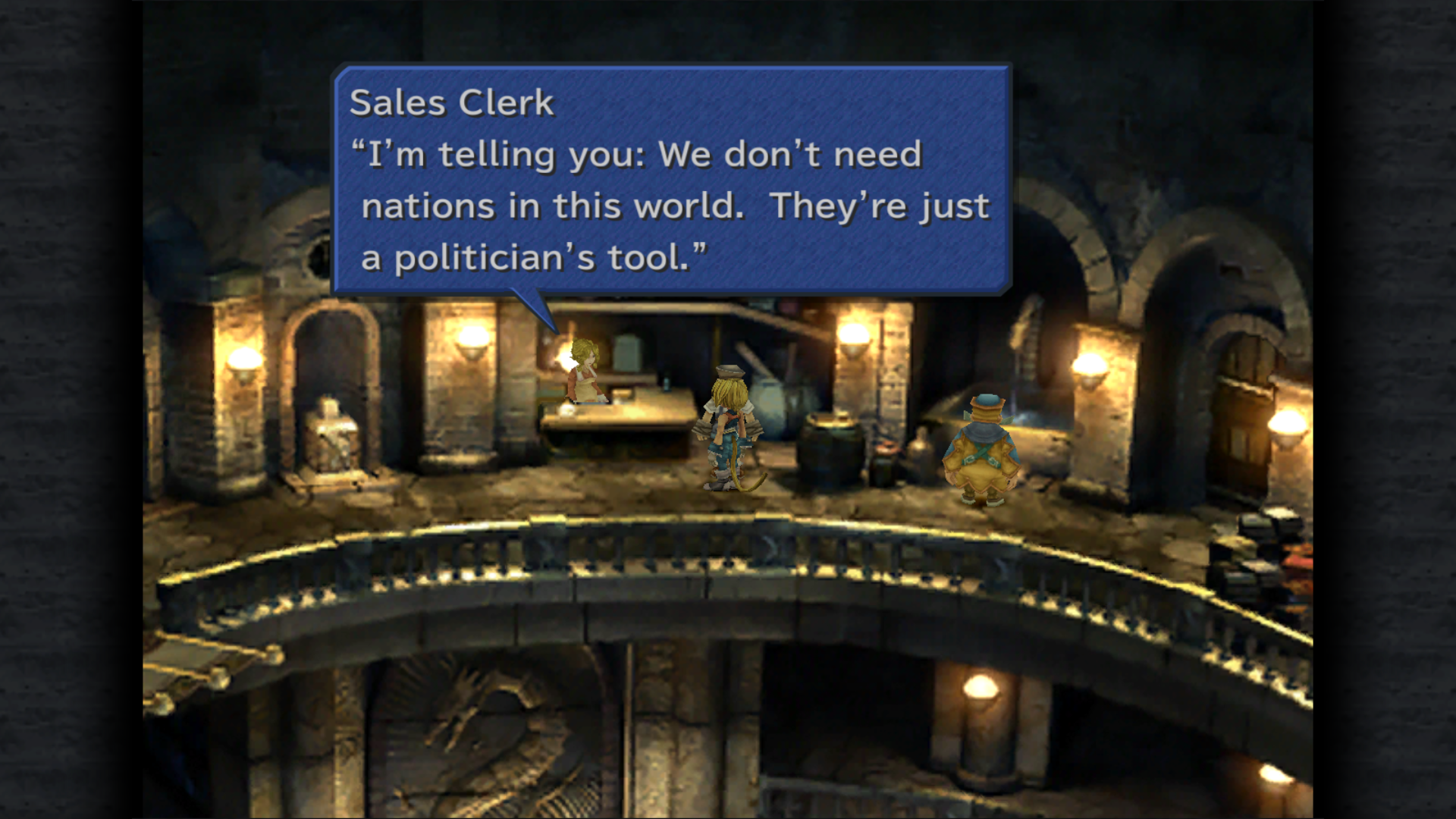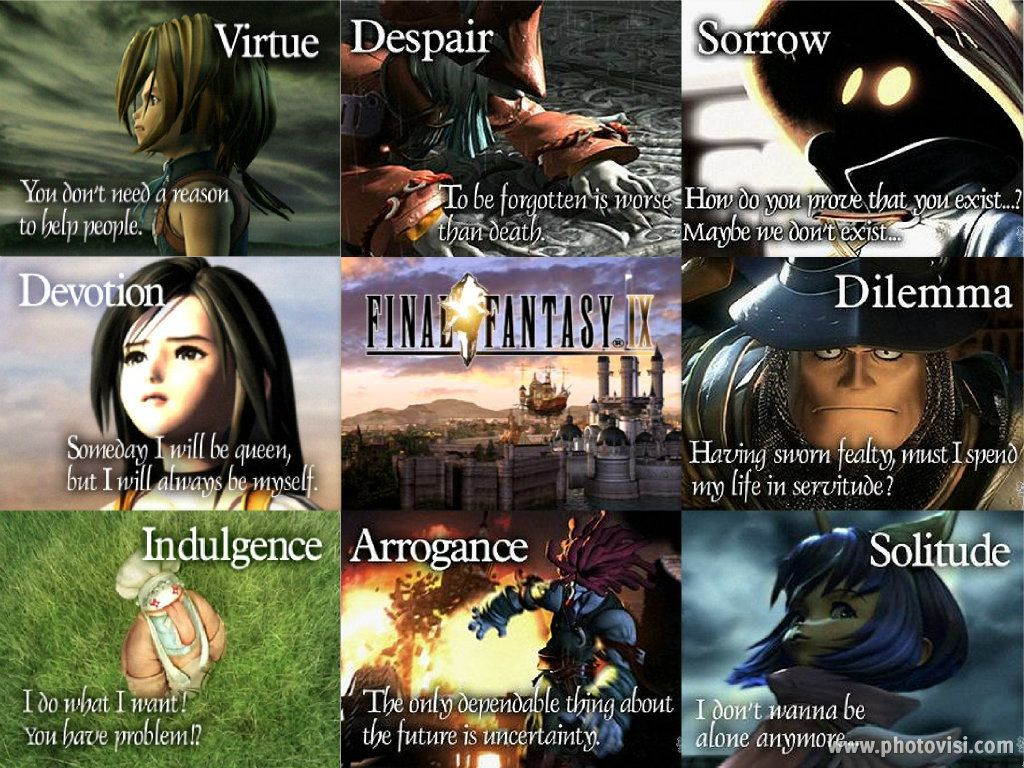Final Fantasy IX - A Mea Culpa

Going into this, Final Fantasy IX was pretty low on my list of favorite Final Fantasy games. It was alright, but it was more of a C-tier in my mental rankings. Now, I hadn’t played this game to completion since 2006, when I was still in high school, So maybe distance and memories of it didn’t paint it in a rosy light. it was just there.
Now it’s much higher on the list and I have a much higher opinion of it, buuuuut…
It’s still my least favorite of the numbered Final Fantasies on the Playstation 1.
It’s an A-Tier game, and I want to go into it more, but something about 8 and 7 just stick with me. I might be able to blame nostalgia a bit for 8, but I do also just adore that game.
Now that I’ve dug myself into a hole with you, the reader, onto the thoughts about FFIX. Spoilers ahead for this game from 2000, so, be aware.
The theme of this game is incredibly direct and about Identity. Hell, this isn’t breaking new grounds; just let the main menu movie play and you’ll see little blurbs from each character posing their core questions. They all have a picture of the character, plus a title, and then the quote. I’ll post them in text below the image.

Starting from the top left…
- Zidane - Virtue - You don’t need a reason to help people.
- Freya - Despair - To be forgotten is worse than death.
- Vivi - Sorrow - How do you prove you exist… Maybe we don’t exist…
- Garnet - Devotion - Someday I will be queen, but I will always be myself.
- Steiner - Dilemma - Having sword fealty, must I spend my life in servitude?
- Quina - Indulgence - I do what I want! You have problem!?
- Amarant - Arrogance - The only dependable thing about the future is uncertainty.
- Eiko - Solitude - I don’t want to be alone anymore.
Each character has to address these questions and find an answer to them. And that’s one of the strengths of this game. Sure there’s a world-ending guy with an inferiority complex larger than the sun kicking about, but this game uses the characters to frame all the big events so well. Everything is tied to their core struggles and questions and you spend so much time with them, figuring out how they think and how they struggle, with Zidane helping them learn to find the answers for themselves.
Freya’s question comes as a result of the person she loved losing his memory, after they had been apart for years. She was so happy to see him again, but devastated that he didn’t know her. Compounding this is that their reunion came after their home city was destroyed, and right before the place they were taking refuge in was attacked. She was able to overcome this sorrow through finding purpose in fighting for her people to protect them and others.
Vivi’s arc occupies primarily the first two disks of the game, with a great button towards the end. Finding out he’s a prototype magical weapon, used as a blueprint for what would become a magical army left him suffering from an existential crisis. Later on, we find a village of those weapons who have also gained senses of identity, he starts to connect with these people like him, before becoming more comfortable and accepting of himself. Towards the end, he helps another race of almost-pupplet-like people into finding purpose and connects them with that aforementioned village.
Garnet is a princess who wants to escape her stifiling mother and wants to see the world. She is confronted a lot with her naivete, and ends up clashing against her mother’s warmongering. Also, was used a bit as a weapon of mass destruction. Throughout the game she was trying to figure out what she wanted, and who she wanted to be, after having so many issues over who her parent has become and who her parents actually were.
Steiner was dutybound to the queen to be Garnet’s protector and ordered to return her home. His duty to the queen came to a head when he was confronted with how awful she had become, and struggled with his own code of ethics developing after travelling with Zidane and company. He had made so many excuses and tried to believe that the queen had a reason for these warcrimes, but ultimately, had to do the right thing and oppose her.
Quina is a joke character, so it’s hard to really like… read to deeply into them, buuuuut… When s/he joins the party, they operate on almost a purely singleminded desire to eat new foods, and even taste things that might not be food, because they don’t know what is or isn’t food in different places. They are the character there to learn about the different cultures and etiquette and becoming more considerate of others.
Amarant is interesting because by and large, they’re a nothing character. Initially, a bounty hunter sent by the queen to retrieve Garnet’s necklace, but once bested by Zidane in combat, thinks he is going to be killed. He’s a very “kill or be killed” type of person who doesn’t understand human connections. Obviously his whole arc is watching how the friendship between Zidane and the other crew members ends up strengthening each of them.
Eiko is the last remaining member of an isolated town of summoners. She lives with a bunch of moogles who have raised her since her grandfather died. She is a 6 year old girl forced to live on her own and ends up latching on to the party, as they need her help to unlock a seal and she needs them to actually feel less alone in her life. At the end she’s actually able to just be a kid with her newly adoptive parents, while still seeing her friends.
Zidane is a character who feels really uncomfortable with his own feelings for most of the game. The type of person who plays things off for jokes or flirts with all the women in order to not get too close to people or to distract him from contemplating his own feelings. He is the type who just jumps in to help everyone else without a second though, but pushes people away when they try to help him. This culminates in the emotional climax of the game for me, at the end of Disk 3. The track “You are Not Alone” plays here, as Zidane is found alone in a room, his memories seemingly erased of his friends. His friends come to save him but he storms off saying they need to leave him alone. As he goes off on his own, he is forced into fights with decently strong enemies to face on his own, but during each encounter, two allies come to support him and try to snap him out of this funk. Each encounter a new two people help as he tries to shrug them off, but they break down his defenses, until the lone one to help him at the end is Garnet, which breaks through.
This shit is my absolute favorite in games like this. Undertale and Hi-Fi Rush also qualify, where the friends you’ve made along the way come up big in the end when you need the help. It’s the best. Especially if you have a great track to go with it. Final Fantasy 9 has that.
https://www.youtube.com/watch?v=AEkPaojuoaI
Everyone’s stories are really well told, but it’s interesting to see exactly how each story is told. Garnet has a big overarching plot, Vivi’s takes up a fair amount of Disk 1 and 2, Zidane’s whole arc doesn’t kick into high gear until Disk 3, Amarant gets only a few solo scenes, so his changes and learning comes through the larger group scenes…
Actually that last one is really smart. His whole arc is about how the bonds between people makes them stronger. This is a man who purposefully isolated himself, believing that the way to strength is through relying only on yourself. So by having him in these situations where first hand he can see how Zidane encourages and is encouraged by everyone else puts him in a direct foil to him.
Anways, by the end, everyone is a more complete person and a more realized individual, able to know what they want in life.
I’ve focused so much more on the characters than the plot because the plot is good for what it needs to do, but it feels way less important than how the characters evolve gradually through the course of the game. Final Fantasy 7’s big character arc was for Cloud coming to terms with who he is, and Red XIII has a moment in Cosmo Canyon, but the big plot overshadows character work. Final Fantasy 8 is the between point of 7 and 9, in terms of Plot vs Character Writing, but the characters don’t grow as much as they do in 9.
Tetra Master being the minigame for this game is kind of a letdown. It’s weird and I don’t like it, but fortunately it’s not a requirement and no real treasures or abilities are locked behind it, unlike how useful Triple Triad is in FF8.
Mechanically, I like the return to “learning abilities through equipment”. Besides that, you then have to equip your learned passives with Ability Stones, a score that goes up as you level up and acts like a way to drip feed up your power scale. You can swap these any time you can access the menu so with some foresight, or after getting crushed by random encounters’ status effects, you can swap them around.
The more I’m writing I might move this above Final Fantasy VII on my PS1 rankings. The strength of each character’s arc will stick with me more than I intially thought and the way it’s all woven together is great. There’s one bit of pacing that I had trouble with (like, 30-60% through Disk 3), but then it picks up and just races to the end. Like, it’s gripping and engaging and the twist is placed well enough that it reinvigorates your interest. All in all, good game!